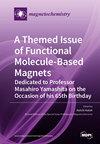Influence of the Particle Size on the Electrical, Magnetic and Biological Properties of the Bioglass® Containing Iron Oxide
IF 2.5
4区 化学
Q2 CHEMISTRY, INORGANIC & NUCLEAR
引用次数: 0
Abstract
Bioglasses have been used throughout the past century as a biomaterial in the bone regeneration field. However, recent studies have attempted to use them as a therapeutic material as well, mainly in the treatment of osteosarcomas. The most widely recognized bioglass is the 45S5 Bioglass, invented by Larry Hench et al., which presents higher bioactivity. A possible application of this bioglass in the treatment of osteosarcomas can be accomplished by adding specific ions, such as iron, that will allow the use of magnetic hyperthermia and Fenton reaction as therapeutic mechanisms. In this study, a 45S5 Bioglass containing 10%mol of Fe2O3 was produced using the melt-quenching method. A group of samples was prepared by changing the overall ball milling time, from 1 h up to 48 h, to analyze the effects of iron in the bioactive glass matrix and evaluate the influence of particle size on their physical and biological properties. The studied bioglasses showed no evidence of changes in the amorphous structural nature compared to the 45S5 Bioglass. The data of the impedance spectroscopy study revealed that the addition of Fe2O3 can increase the standard rate constant of the Electro-Fenton reaction, with the sample milled for 12 h showing the most promising results. The reduction in the particle size influenced the cytotoxicity and the bioactivity. The samples with lower particle sizes showed a higher level of cytotoxicity.颗粒尺寸对含氧化铁生物玻璃®电、磁和生物性能的影响
在过去的一个世纪里,生物玻璃作为一种生物材料被广泛应用于骨再生领域。然而,最近的研究也试图将它们作为一种治疗材料,主要用于骨肉瘤的治疗。最广为人知的生物玻璃是由Larry Hench等人发明的45S5生物玻璃,它具有更高的生物活性。这种生物玻璃在骨肉瘤治疗中的可能应用可以通过添加特定离子(如铁)来实现,这将允许使用磁热疗和芬顿反应作为治疗机制。本研究采用熔淬法制备了含10% Fe2O3的45S5生物玻璃。通过改变球磨时间,从1 h到48 h,制备了一组样品,以分析铁在生物活性玻璃基质中的作用,并评估颗粒尺寸对其物理和生物性能的影响。与45S5生物玻璃相比,所研究的生物玻璃没有显示出非晶结构性质变化的证据。阻抗谱研究数据表明,Fe2O3的加入可以提高电fenton反应的标准速率常数,其中研磨12 h的效果最好。颗粒大小的减小影响了细胞毒性和生物活性。粒径较小的样品显示出较高的细胞毒性。
本文章由计算机程序翻译,如有差异,请以英文原文为准。
求助全文
约1分钟内获得全文
求助全文
来源期刊

Magnetochemistry
Chemistry-Chemistry (miscellaneous)
CiteScore
3.90
自引率
11.10%
发文量
145
审稿时长
11 weeks
期刊介绍:
Magnetochemistry (ISSN 2312-7481) is a unique international, scientific open access journal on molecular magnetism, the relationship between chemical structure and magnetism and magnetic materials. Magnetochemistry publishes research articles, short communications and reviews. Our aim is to encourage scientists to publish their experimental and theoretical results in as much detail as possible. Therefore, there is no restriction on the length of the papers. The full experimental details must be provided so that the results can be reproduced.
 求助内容:
求助内容: 应助结果提醒方式:
应助结果提醒方式:


